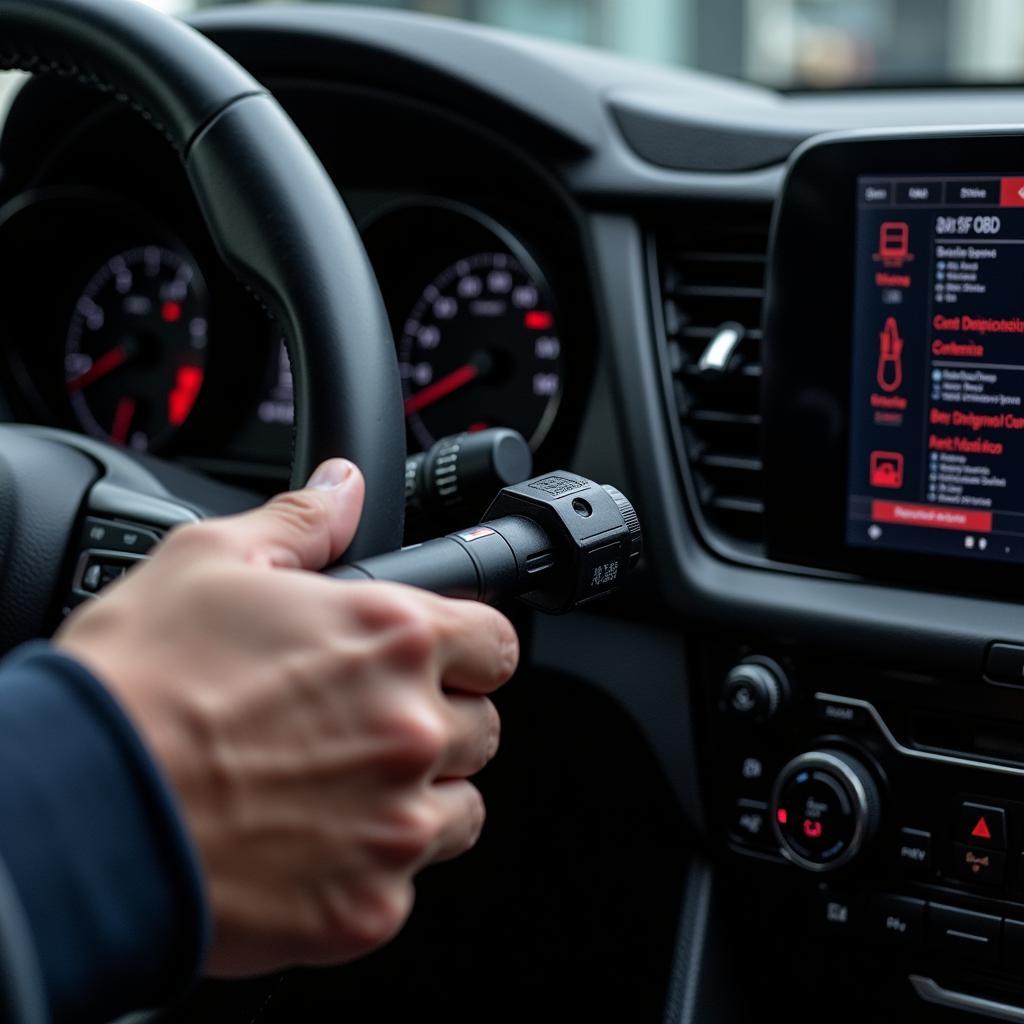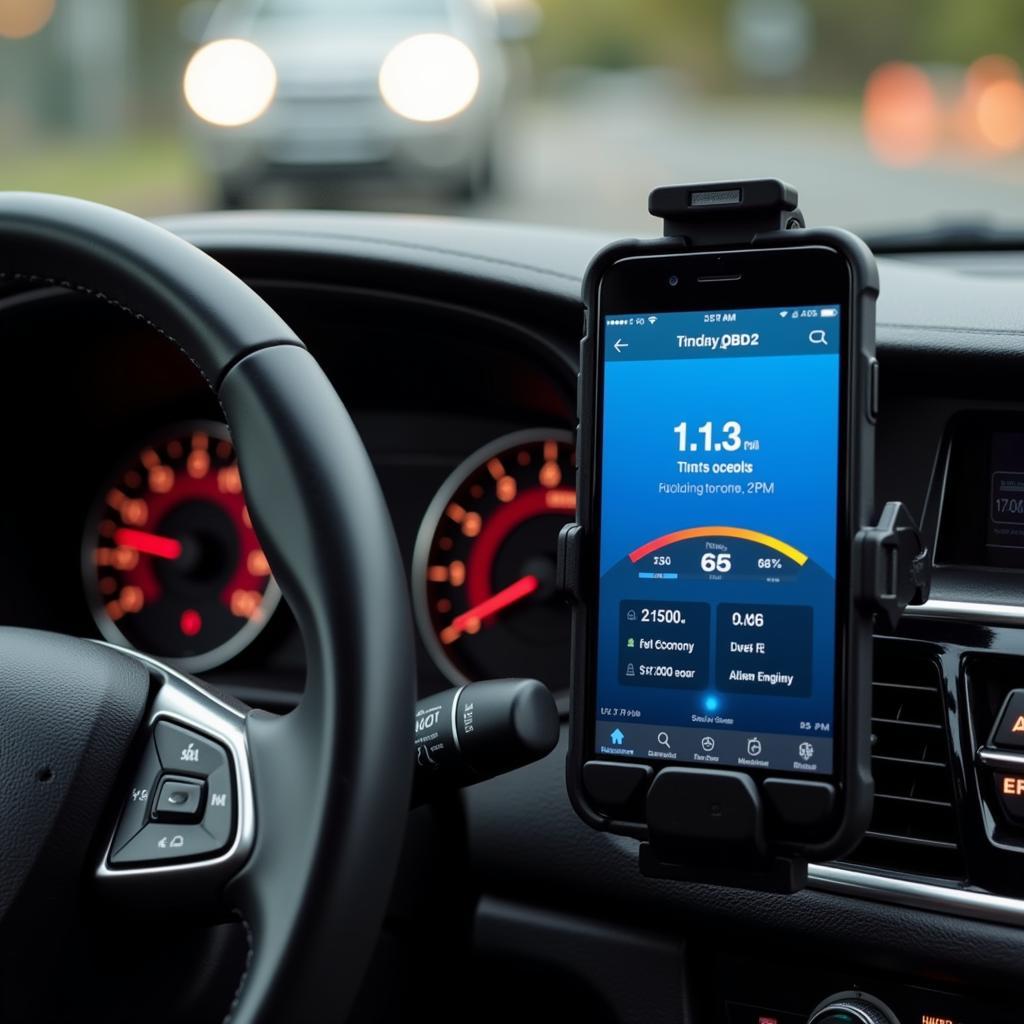Choosing the best car OBD diagnostics tool and app can feel like navigating a maze. With countless options flooding the market, each promising to be the ultimate solution, it’s easy to feel overwhelmed. Whether you’re a seasoned mechanic or a car enthusiast looking to demystify those cryptic dashboard lights, this guide will equip you with the knowledge to make an informed decision.
Understanding OBD, OBD2, and Their Significance
Before diving into the specifics of diagnostic tools and apps, let’s clarify the foundation – OBD (On-Board Diagnostics). This onboard computer system, present in most cars since 1996, acts as a car’s built-in mechanic. It continuously monitors various systems, flagging potential issues by storing diagnostic trouble codes (DTCs) within its memory.
OBD2, the standardized version adopted in the US and widely used globally, made things significantly easier. It provides a universal connector (that trapezoidal port under your dashboard) and a standardized communication protocol. This allows any compatible OBD2 scanner to retrieve and interpret those DTCs, shedding light on your car’s health.
Why You Need a Car Diagnostic Tool and App
Gone are the days of relying solely on mechanics for every engine hiccup. A reliable car diagnostic tool and app empowers you to:
- Diagnose Car Problems: Identify the root cause of those pesky check engine lights, ABS warnings, or airbag indicators.
- Save Money: Avoid unnecessary trips to the mechanic for simple fixes.
- Prevent Costly Repairs: Early detection of potential issues can prevent them from escalating into major (and expensive) problems down the road.
- Gain Peace of Mind: Enjoy the confidence that comes with understanding your car’s health and addressing issues proactively.
- Enhance Resale Value: Maintain a detailed vehicle history using the app, showcasing proper maintenance and potentially increasing resale value.
 Mechanic using OBD2 scanner on a car
Mechanic using OBD2 scanner on a car
Key Features to Consider
Not all car diagnostic tools are created equal. Here are the essential features to prioritize:
1. Compatibility: Ensure the tool or app supports your car’s make, model, and year. While most tools are universally compatible with OBD2 vehicles, certain advanced functionalities might require specific compatibility.
2. Functionality: Determine your needs – do you require basic code reading or advanced features like live data streaming, bi-directional controls (sending commands to the car), and ECU (Engine Control Unit) programming?
3. User Interface: Opt for an intuitive and user-friendly interface, whether it’s a standalone device with a clear display or a mobile app with a well-designed layout.
4. Data Logging and Reporting: The ability to log data over time and generate reports can be invaluable for tracking car performance, identifying recurring issues, or even sharing information with your mechanic.
5. Updates and Support: Choose a tool or app that offers regular software updates to stay compatible with the latest car models and provide access to a reliable support team for any troubleshooting needs.
Choosing Between a Standalone Tool and a Mobile App
Standalone OBD2 Scanners:
- Pros: Generally more robust and reliable, often equipped with more advanced features and larger screens, may not require a smartphone connection.
- Cons: Can be more expensive than mobile app solutions, might require separate updates.
Mobile OBD2 Apps:
- Pros: Highly portable, generally more affordable, often offer user-friendly interfaces and seamless data logging, updates are typically automatic.
- Cons: Reliant on smartphone connection, might not offer the same depth of functionality as standalone tools.
 Smartphone displaying OBD2 app data
Smartphone displaying OBD2 app data
Navigating the World of Car Diagnostic Tools and Apps
Finding the “best” tool boils down to your individual needs, budget, and technical comfort level.
For the DIY Enthusiast: A basic Bluetooth OBD2 adapter paired with a reputable free or low-cost mobile app like Torque Pro, OBD Fusion, or DashCommand can provide a great starting point. These solutions are perfect for reading and clearing codes, monitoring basic engine parameters, and getting a general sense of your car’s health.
For the Advanced User: A professional-grade standalone scanner like the Autel MaxiCOM MK808, Innova CarScan Pro, or Launch CRP129X offers a comprehensive suite of features. These tools are ideal for experienced DIYers, mechanics, or small workshops handling more complex diagnostics and repairs.
Making an Informed Decision
The world of car diagnostics doesn’t have to be intimidating. By understanding your needs, researching different options, and considering the factors outlined in this guide, you can confidently choose the best car OBD diagnostics tool and app to become your own car doctor. Remember, knowledge is power, and when it comes to your car, that power rests in your hands.

Leave a Reply